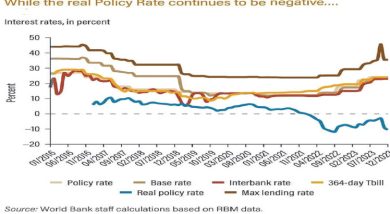Malawi falling inflation to trigger further interest rate cuts

Investment advisory firm Nico Asset Managers Limited says the declining inflation may trigger a fall in interest rates provided liquidity levels in the banks improve.
Inflation, the monster that erodes people’s disposable income, has been on the downward spiral since April this year and the rate is currently at 27.9 percent as of June.
Most of the banks have reduced their base lending rates to around 38 percent from above 40 percent, a clear signal of the improvement of liquidity in the banking sector.
This is despite the Reserve Bank of Malawi (RBM) maintaining the bank rate—the rate at which commercial banks borrow from the central bank as the lender of last resort—at 25 percent, citing inflationary risks which remain on the upside and has decided to observe inflationary developments in the next two months.
“Overall, we forecast interest rates to decline in next quarter but will remain elevated. Lower interest rates are likely to result in improving private sector investment and growth through increased borrowing. Lower borrowing costs may also result in lower risk of defaults of existing liabilities,” says the firm in its July 2013 monthly economic report.
In the July, the daily average amount that banks borrow from RBM stood at K2.4 billion (about $6m), decreasing from K3.3 billion (about $8.2m) in June 2013, a 27 percent decrease.
At the same time, borrowing between banks [inter-bank borrowing] averaged K1.6 billion (about $4m) per day in July from K3.3 billion per day in June 2013, an increase of 52 percent increase).
Total borrowing, RBM plus between banks, per day in July slumped 40 percent to K3.95 billion from K6.6 billion in June, a clear indication of improving liquidity levels which could trigger a reduction in interest rate.
The sales of tobacco, to wind up by the end of August, has helped to improved liquidity levels, resulting in interbank lending rates, albeit still high, declining.
Government has also reduced overall borrowing with Treasury bills (T-bills) allotments only being sufficient to roll over existing debt.
Recently, the Ministry of Finance and RBM signed a memorandum of understanding (MoU) establishing that ministry will bear the interest costs of using T-bills for monetary operations.
The International Monetary Fund (IMF) has urged monetary authorities to maintain a tight monetary policy.





